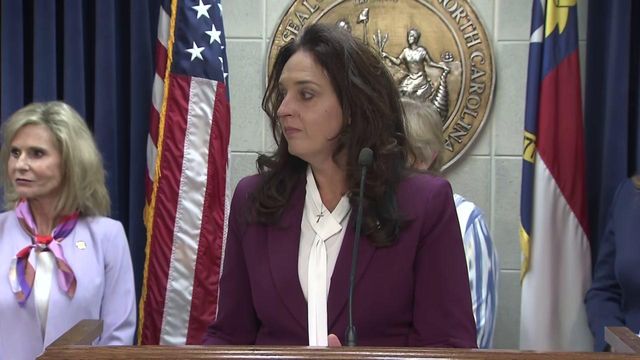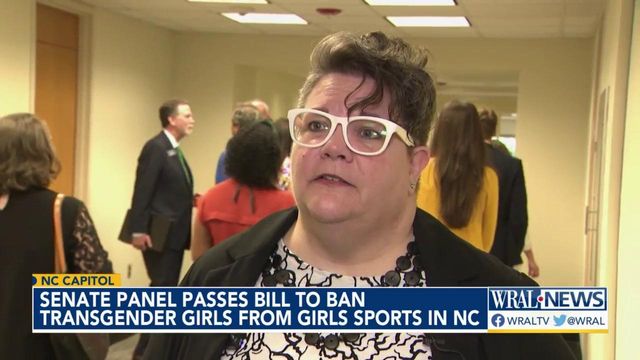NC House passes bill to ban transgender women from girls' sports through college
An injured high school athlete from western North Carolina urged state lawmakers to pass a blanket ban prohibiting transgender women from playing on girls' sports teams in middle school, high school and college as bills sped through the legislature.
The House passed its version of the bill Wednesday afternoon with all Republicans present voting for the bill along with at least three Democrats. The Senate could vote on its version of the bill, which does not impact college athletics, as soon as Thursday.
Payton McNabb, a volleyball and softball player at Hiwassee Dam High School in Murphy, told lawmakers about the injuries she suffered after being hit by a spike from a transgender athlete on the other team.
"Due to the North Carolina High School Athletic Association policy allowing biological males to compete against biological females, my life has been changed forever," McNabb said of the September incident. "I suffered from a concussion and a neck injury that, to this day, I am still recovering from."
McNabb said she suffers from impaired vision, partial paralysis on her right side, headaches, anxiety and depression as a result of the play. She said she was unable to finish the volleyball season and is unable to perform at her previous level on the softball team.
"I'm not here for me because I know that my time playing is coming to an end," she said. "I'm here for every biological female athlete behind me, my little sister, my cousins, my teammates. Allowing biological males to compete against biological females is dangerous. I might be the first to come before you with an injury but, if this isn't passed, I won't be the last."
How common are transgender athletes in NC?
Current rules in North Carolina allow transgender athletes to play sports based on their gender identification, though it requires a lengthy process, including medical information.
There have been 18 gender-waiver requests submitted to the North Carolina High School Athletic Association since its current policy was put in place before the 2019-20 school year. One was incomplete. One was denied.
Of the 16 that have been approved, 14 were biological females requesting to play on boys' teams. Just two were biological males requesting to play on girls' teams, according to Que Tucker, the commissioner of the NCHSAA. There requests do not mean those athletes tried out for the team or made the team.
"The data from North Carolina does not suggest that we are being overrun with born males participating on female teams," Tucker told WRAL on Wednesday after the House vote.
A big problem or discrimination?
Former University of Kentucky swimmer Riley Gaines, former University of North Carolina women's basketball coach Sylvia Hatchell and professional cyclist Evie Edwards, a Democrat who lives in Asheville, also pressed lawmakers to pass the legislation.
Gaines, a 12-time All-America swimmer, competed against transgender swimmer Lia Thomas at the NCAA meet. Gaines said woman were also forced to share a locker room with Thomas without their consent. Gaines and Thomas tied in a race, but Gaines said Thomas was given the trophy for photos.
"I felt betrayed and belittled," said Gaines, who has become a national spokeswoman on this issue. "I felt like my efforts and my sacrifices had been reduced down to a photo op to validate the identity and feelings of a male. My feelings do not matter."
But some legislative Democrats and trans supporters insisted the bills discriminate against a vulnerable segment of the population.
"This kind of legislation has recently been rejected by conservative governors in other states, because it is discriminatory on its face and wholly inconsistent with basic civil rights recognized by our highest courts," said Rep. Vernetta Alston, a Durham Democrat. "This bill is a pretext for bigotry. It's a part of what I think is a larger effort to ban transgender people from living their lives openly."
North Carolina state lawmakers in recent weeks introduced several bills dealing with transgender youth, including access to certain types of medical care. It is part of a national push on transgender issues.
Idaho Rep. Barbara Ehart, a Republican, was in Raleigh on Wednesday to lobby for passage. She said she introduced the first legislation in Idaho, and now 21 states have passed bans on transgender athletes.
It comes as the Biden administration has proposed a rule to outlaw blanket bans, likely setting up conflict between state laws and federal guidance.
"We have to acknowledge that there is a national debate that is anti-trans and anti-LGBTQ," said Sen. Julie Mayfield, a Buncombe County Democrat. "And this bill exists in the context of that national debate and makes it very difficult for those of us who might agree with this on some level and are huge champions of women's sports and want to protect women to support a bill like this when it comes in the context of the existing national debate."
Trans supporters, including parents, counselors and others who spoke against the bill in public testimony, argued that the law and others like it could have harmful impacts on transgender children.
"Laws like this send a clear message to trans people that we are not accepted, not wanted and not welcome," said Cat Salemi, a counselor who works with transgender and non-binary patients.
What's next?
The NCAA updated its transgender student-athlete participation policy just this week, outlining a sport-by-sport approach. Beginning Aug. 1, 2024, transgender athletes must provide documentation that meets sport-specific standards such as testosterone levels, mitigation timelines and other aspects of sport-governing body policies.
The North Carolina legislation is in direct conflict. It says "a student's sex shall be recognized based solely on the student's reproductive biology and genetics at birth.."
Tucker, the high school administration official, said she's proud of how the state has handled the issue so far.
"We have done our part as executive directors and commissioners, that is to be inclusive and try to find the solutions," she said. "If that is taken out of our hands and it is legislatively determined, so be it. We follow the law."
There was enough support in Wednesday's vote to override a gubernatorial veto.
Rep. Tricia Cotham, who recently switched party affiliation from Democrat to Republican, voted yes on the measure in the House committee and on the House floor. She did not respond when asked for a comment after the meeting.
Cotham's 2022 platform said that "LGBTQ+ youth are under attack by Republican state legislatures across the country. I will stand strong against discriminatory legislation and work to pass more protections at the state level."
The House bill says any student "who is deprived of an athletic opportunity or suffers or is likely to suffer any direct or indirect harm as a result of a violation of this" can sue for relief as well as damages within two years of the date that the harm occurred. The same goes for representatives or employees of schools, as well as anyone who faces retaliation for reporting a violation, according to the bill.
The Senate version passed through the rules committee Wednesday, typically the last stop before a vote on the floor. Republicans say such a blanket ban is needed for safety and fair play reasons.
"This isn't anti-anything. This is pro-woman," said Sen. Vickie Sawyer, an Iredell County Republican and a primary sponsor of the legislation. "This is a pro-woman bill."











